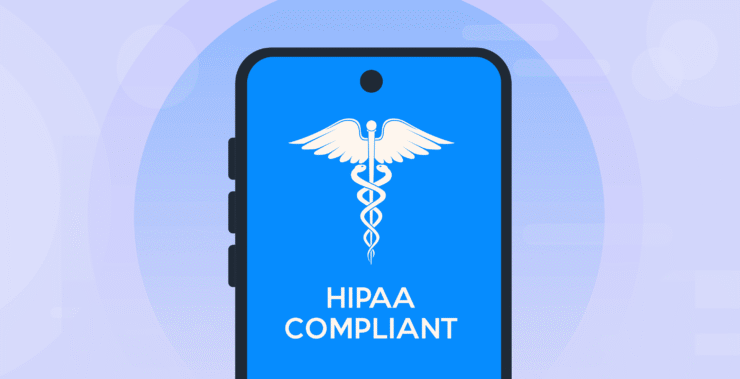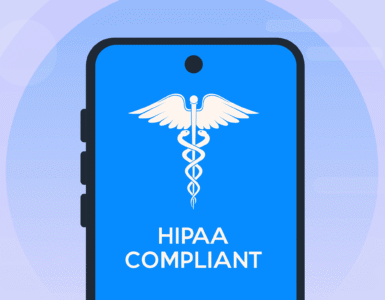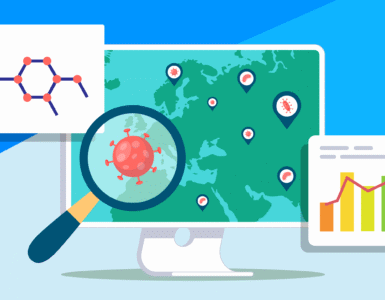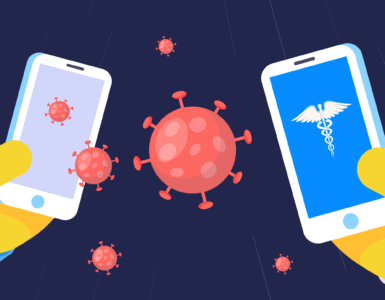“Was that message really secure?”
It’s a question every healthcare professional should be asking. A quick text with a lab result or patient update may feel routine, but it’s still protected health information (PHI) – and HIPAA requires that it stays confidential. According to HIPAA Journal in 2024, the protected health information of 276,775,457 individuals was exposed or stolen. On average, that’s 758,288 records per day – a stark reminder that even a casual message can have serious consequences. This risk isn’t just theoretical, it’s amplified by the very communication tools many professionals use every day.
Many modern chat tools, like Slack, with their familiar, user-friendly interfaces – much like WhatsApp and other everyday messaging apps – can unintentionally encourage casual conversations, making it easy to let your guard down. In a healthcare environment, this comfort can make it easy to forget that the information being shared is sensitive PHI, much like overheard whispers around the nurse station or doctor’s office while treatment plans are discussed. It’s an easy mistake, but one with potentially huge ramifications.
This is why secure healthcare communication must be the foundation of modern care. Every message should be encrypted, every file protected, and every access tightly controlled. HIPAA-compliant messaging apps exist to meet this exact challenge, keeping confidential information safe while letting your team stay connected and compliant.
Unlike general chat tools, some platforms are built specifically for healthcare and life sciences, but Chanty takes a slightly different approach. While not designed exclusively for healthcare, Chanty has been fully HIPAA-compliant from day one. It combines secure chat with task management, company-wide announcements, and admin-level oversight, giving medical teams a single intuitive workspace where communication, workflows, and compliance come together.
It’s not just about speed – it’s about security at every step. With two-factor authentication, full data encryption, and optional self-hosted storage, Chanty makes secure healthcare messaging practical and reliable. Curious how it can work for your team? Chanty is already helping healthcare organizations collaborate safely and efficiently.
Whether you’re a care provider, administrator, or part of a clinical operations team, adopting a HIPAA-compliant chat isn’t just smart – it’s essential. Let’s explore how these tools work, what to look for, and why getting it right matters more than ever.
14 best secure HIPAA messaging apps
- Chanty for HIPAA-compliant collaboration with task management and admin controls
- Klara for encrypted patient messaging and appointment scheduling
- MessageDesk for safe SMS conversations with patients
- TigerConnect for real-time team messaging and HIPAA-aligned collaboration
- HelloHealth for private patient communication and engagement
- Rocket.Chat for open-source, HIPAA-ready team messaging
- Notifyd for internal healthcare notifications and private team messaging
- Brosix for encrypted team chats over private networks
- OnPage for urgent alerts and critical messaging in healthcare settings
- Blaze for building HIPAA-friendly communication apps without coding
- Solutionreach for outreach, reminders, and compliant patient interaction
- OhMD for texting and video calls with patients and clinical staff
- Updox for HIPAA-compliant forms, messaging, and telehealth
- Doxy.me for private video visits with patients in full compliance
Why regular messengers don’t work in healthcare
In today’s world, where texting has become the most common way people communicate, we constantly have to stay alert. It’s no longer just about who we send a message to, but also through which channels we deliver sensitive information – channels that can be attacked or compromised at any moment.
Nowhere is this vigilance more critical than in healthcare. Here, every message can literally be a matter of life, death… and legality.
We’ve grown used to convenience. With modern smartphones, everything lives in one place. A couple of taps, and you can access lab results, contact a colleague across the country, or check patient updates on the go. Naturally, in a clinical setting, staff want to keep that convenience and continue using their personal devices – without carrying an extra work phone or tablet.
But here’s the problem: Nearly 80% of medical professionals use personal devices without proper login or logout procedures.This opens the door to security gaps, data leaks, and potential HIPAA violations. The same desire for convenience drives people back to standard messengers like WhatsApp or iMessage.
And that raises the big question: Are these apps appropriate for sharing patient data?
The answer is a clear no. While they feel harmless for daily use, when it comes to protected health information (PHI), they fail to meet security and compliance standards.
Here’s why:
- Files don’t disappear when the chat ends. A lab result or X-ray image you send might stay in your phone gallery or end up backed up in your personal cloud storage.
- No strict access control. If your phone is unlocked or shared, sensitive patient details are just a tap away from exposure.
- No guaranteed audit trail. Unlike healthcare-specific tools, consumer messengers don’t track or log who accessed the information and when – which is critical for compliance.
- No BAA. Without a Business Associate Agreement, sharing PHI through a consumer app is a compliance risk by definition.
So while using regular messengers feels quick and familiar, they can easily become the weakest link that puts both your hospital and yourself at risk of penalties and lawsuits. A secure hospital communication systems reduces that exposure by keeping clinical chat, files, and audit trails in a controlled, compliant environment.
Why healthcare and life sciences need HIPAA-compliant communication apps
That’s why secure patient messaging solutions and HIPAA-compliant chat platforms exist. Unlike everyday messengers, they are designed for medical use and structured around strict protocols like HIPAA and GDPR. Both focus on privacy, but their scope and enforcement differ:
- HIPAA – U.S.-specific, mandatory for all healthcare entities, focused on protecting PHI with strong confidentiality, access control, and compliance reporting.
- GDPR – Broad European regulation covering all types of personal data, emphasizing consent, transparency, and individual rights.
In practice:
- For a clinic in Paris, GDPR compliance may be enough.
- For a hospital in New York, HIPAA-compliant messaging is non-negotiable.
- For practices like therapy sessions, solutions offering HIPAA-compliant texting for therapists ensure confidentiality is never compromised.
- And at a larger scale, specialized healthcare messaging apps allow teams to combine convenience with security, keeping communication safe and legal while avoiding fines or lawsuits.
In short, consumer-grade tools might feel easy, but they’re not built for the realities of modern healthcare. Only secure, regulation-ready solutions can balance the daily convenience staff crave with the compliance organizations require.
Key features to look for in a HIPAA-compliant text messaging app
Choosing the right HIPAA-compliant messaging system can feel daunting, and with around 85 million healthcare records breached in 2024 alone, the stakes have never been higher. Unsecured communication isn’t just an inconvenience; it can lead to serious compliance issues and put patient data at risk. You need an application that not only safeguards sensitive information but also supports your team’s workflow efficiently.
Here are the essential features to look for in secure patient messaging software:
1. End-to-end encryption
Imagine encryption as your digital bodyguard. End-to-end encryption means only the receiver and sender have the ability to read the message – no one else, not even hackers or the service provider. This is a requirement of any HIPAA-compliant chat. Without it, patient information isn’t really protected, regardless of what the app guarantees.
2. Audit trails
Ever wonder who saw a message and when? Audit trails give you that visibility. They track who sent, opened, or deleted messages, so your team can be held accountable. This is critical in healthcare – it permits compliance audits and guarantees dispute resolution by having an open book on communications.
3. Secure file sharing
You don’t simply text. Sharing confidential reports – ranging from test results to imaging studies – requires the same level of security. A good app protects these documents both in transit and in storage so sensitive patient data can’t be compromised. With the right secure patient messaging solution, file sharing is effortless and hassle-free.
4. Access control
Not everyone needs to read all messages. Access control enables you to restrict who views sensitive information by role or team. Either administrative staff or ward staff, only authorized users get access. This minimizes risk and keeps patient data safe within your organisation.
5. Message expiration
And the best defense at other times is to make messages self-destruct. Expiring messages will remove texts automatically after a set time period, reducing the chances of sensitive information lingering on forever. It’s a soft self-destruct button – less theatrics, more data safety.
6. Multi-device syncing
Caregiving teams are in constant transit. Multi-device syncing allows staff to view messages securely on laptops, tablets, or smartphones. Flexibility can’t be at the expense of security, though – all devices need to be encrypted and protected so patient information remains safe and confidential everywhere.
7. User-friendly interface
If your employees struggle with using the app, compliance will suffer. A HIPAA compliant messaging application will have to balance best-of-breed security with ease of use. From administrators to clinicians, the application needs to be easy enough to use so that all of your employees can securely communicate without frustration or delay.
In-depth comparison of mobile & online messaging apps
Now that we’ve covered the must-have features for a HIPAA-compliant text messaging app, it’s time to explore some of the best options available. With so many apps on the market, choosing the right one can feel like a puzzle. But don’t worry we’ve done the heavy lifting for you. Below is a list of some trusted HIPAA-compliant Slack alternatives, packing all the essential features you need to stay compliant and efficient. Whether you manage a healthcare practice or a team dealing with sensitive information, these apps will make your communication secure and seamless.
| Tool / App | Key Features for Healthcare | Pricing | Ease of Adoption |
|---|---|---|---|
| Chanty | Secure messaging, file sharing, task management, admin controls – a full secure hospital communication system | Free; Business $4/user/month (annual), Enterprise custom | Easy – intuitive interface, simple onboarding, minimal training required |
| Klara | Patient messaging, telehealth support, EHR integration, reminders – secure patient messaging solutions | Pricing on request | Medium – workflow-focused UI; some training needed for full EHR integration |
| MessageDesk | SMS campaigns, appointment reminders, secure text communication | Individual Free; Team $29/user/month; Enterprise on request | Easy – designed for clinics; familiar texting interface |
| TigerConnect | Secure texting, on-call management, escalation, patient handoff tools | Pricing on request | High – many features require dedicated training; used widely in hospitals |
| HelloHealth | Telehealth, secure patient messaging, scheduling, reminders | From $49/month | Medium – some learning for telehealth features |
| Rocket.Chat | Secure messaging, file sharing, self-host option, integrations | Starter Free; Pro $4/user/month | Medium – open-source flexibility; requires setup and IT support |
| Notifyd | Alerts, secure messaging, on-call communication | Standard $500/month/location; Annual $5400/location; Enterprise on request | Medium – focused on critical alerts; training needed for workflow integration |
| Brosix | Secure messaging, screen sharing, file transfer – secure hospital communication system | Pricing on request | Easy – lightweight, familiar chat interface |
| OnPage | Critical alerts, escalation management, secure messaging | Pricing on request | Medium – specialized alert system, requires training for workflow |
| Blaze | Secure texting, patient communication, reminders | Pricing on request | Medium – intuitive, but requires setup for clinic workflows |
| Solutionreach | Patient outreach, appointment reminders, surveys – secure patient messaging solutions | Pricing on request | Medium – workflow adaptation needed; interface generally easy for staff |
| OhMD | Secure patient texting, telehealth, patient outreach | Free basic, Pro from $195/month | Easy – SMS-like interface familiar to staff, quick onboarding |
| Updox | Secure messaging, patient engagement, fax/email, telehealth | Pricing on request | Medium – multiple features can overwhelm initially; training recommended |
| Doxy.me | Telehealth video, secure patient communication | Free, Pro $35/month | Easy – simple web interface; designed for fast adoption by clinicians |
Let’s dive deeper into the top options for HIPAA-compliant texting:
Chanty
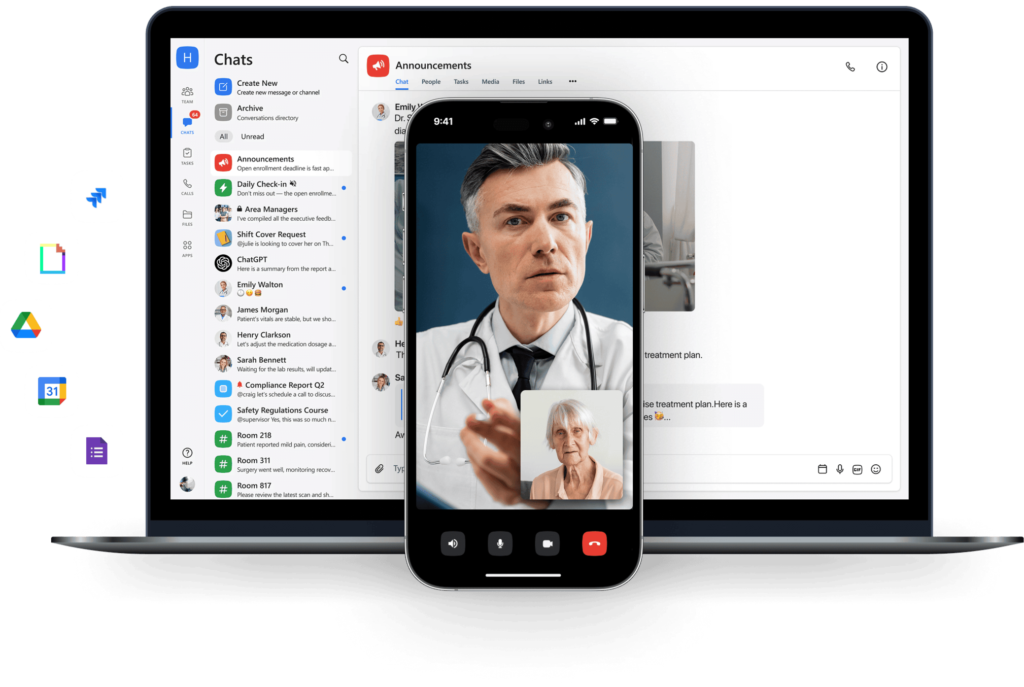
Chanty is a reliable, versatile communication platform designed for healthcare professionals and life sciences teams. From running an active hospital department to coordinating care in a private practice, or facilitating cross-team collaboration, Chanty makes your communication easy, compliant, and rock-solid.
As a HIPAA-compliant messaging app – also supporting GDPR and DLP standards – Chanty enables secure communication while helping teams reduce friction and stay focused on care. From real-time messaging to company-wide announcements and task coordination, everything stays in one place and protected by default.
You can use Chanty as a centralized hub for secure hospital communication systems, supporting cross-functional teams, admin staff, and clinicians who need clarity and speed.
What you can have:
- Private and secure chat with end-to-end encryption and access controls – fully HIPAA-compliant.
- Company-wide Announcements to send non-editable, reply-free alerts that everyone sees without distraction.
- Custom user permissions to control visibility of sensitive files and conversations.
- Mobile and desktop support for secure access across locations and shifts.
- Secure file sharing for lab results, imaging scans, and care plans – shared only with the right people.
- IP allow listing on Business Plan to restrict platform access to trusted clinical networks.
- Built-in task management with a visual Kanban board for tracking critical care workflows.
- Simple integrations with scheduling tools, file storage, and third-party platforms.
Pros:
- Clean, intuitive interface that works for doctors, nurses, admin staff, and IT teams alike.
- Full support for HIPAA, GDPR, and DLP, with no extra configuration needed.
- Built for secure patient messaging solutions and internal collaboration.
- Real-time coordination across shifts, departments, and remote locations.
- Cost-effective and scalable – even for smaller teams or multi-location healthcare organizations.
Cons:
- No native integration with EHR/EMR systems
- Not designed for clinical documentation or direct patient record handling.
- No dedicated telehealth module, though video calling is available.
Chanty is constantly evolving with the needs of healthcare teams. We’re open to feedback, integration opportunities, and real-world insights – because great tools should adapt to the people who use them.
Pricing:
- Free plan for small teams – includes core messaging, limited integrations, and team collaboration.
- Business plan: $3 per user/month (billed annually) – includes admin controls, advanced security, and full functionality.
- Enterprise plan: Special pricing for larger businesses with particular compliance or infrastructure requirements.
Klara
Klara’s platform is built to help healthcare professionals improve their communication with patients. From appointment scheduling to treatment follow-up, Klara keeps everything in one secure and HIPAA-compliant place perfect for the busy medical practice.
What you can do:
- Message patients and health care staff securely, knowing everything is encrypted to protect sensitive health information.
- Send real-time notifications to inform the patients about rescheduling or canceling of appointments and even any kind of emergency notifications.
- Automate patient reminders and follow-ups, saving your staff time in routine communications.
- Share medical records, test results, and other sensitive files securely with patients or colleagues.
- Easily integrate Klara with your current EHR system, so you won’t have to toggle between systems.
Pros:
- The platform is intuitive – meaning you won’t spend hours figuring out how to use it. It’s built for HIPAA compliance, thus you can rest assured with the security of your patient data.
- Integrating into your healthcare systems streamlines your workflow.
Cons:
- Some of the advanced features require setup support.
- No free version available.
Pricing:
Klara’s pricing starts at $250 per month per provider, which includes secure messaging, patient outreach, and telemedicine capabilities. They also offer custom plans for larger organizations with additional needs.
MessageDesk
MessageDesk is a HIPAA-compliant Slack alternative built for healthcare providers. From appointment scheduling to reminders, MessageDesk enables health care organizations to connect securely with patients and staff members easily.
What you can do:
- Send encrypted text messages to your patients and staff without any possible breaches in privacy.
- Automate appointment reminders; make sure patients don’t miss their visit, and you won’t have to follow up with them personally.
- Share lab results and medical documents with patients in a secure and fast manner, always keeping information private.
- Receive real-time notifications of appointments or urgent updates to keep one informed.
- Manage patient communications from one platform and avoid the use of multiple tools.
Pros:
- High-level security with HIPAA compliance and end-to-end encryption.
- Real-time notifications regarding important updates.
- The automation feature saves time by reducing manual outreach.
Cons:
- A few users find the system to be less customizable.
- Pricing for larger organizations is higher.
Pricing:
MessageDesk provides a Starter plan at $14 per user per month, which includes basic messaging features. The Pro plan is available at $29 per user per month, offering advanced features like automation and integrations.
TigerConnect
TigerConnect provides a family of communication solutions for healthcare, each with security and ease of integration in mind. It’s designed to help providers collaborate without compromise, from text messaging to video calls.
What you can do:
- Send and receive encrypted messages. Every message sent is secure and HIPAA-compliant.
- Make protected voice and video calls to staff or patients anywhere.
- Send urgent messages with real-time notifications, letting your team take quicker action in life and death situations.
- Integrates seamlessly with existing healthcare systems such as EHR or other management software.
- Use analytics to track message volumes and organizational communication efficiency.
Pros:
- Robust security: cloud-native integrations
- Multi-tool communicator: text up to video calls
- Enhances team collaboration by streamlining workflows
Cons:
- Advanced functionality may require additional training.
- Can be pricey for smaller healthcare practices.
Pricing:
TigerConnect provides customized pricing plans according to usage and team size.
HelloHealth
HelloHealth is a patient communication platform leveraging HIPAA-compliant text messaging. HelloHealth puts the power of relationships at the center of medical practices, keeping all patient communications safe and organized.
What you can do:
- Send secure, encrypted messages to patients for appointment reminders, test results, and general communication.
- Automate patient communications so your staff saves time, yet patients will not miss any information.
- Share patient medical records, laboratory results, and forms securely.
- Real-time text alerts will keep your patients up-to-date on urgent health information, schedule changes, or health concerns.
- HelloHealth will further streamline your workflow by integrating with your existing practice management systems.
Pros:
- Clear-cut, straightforward solution for small to medium-sized healthcare practices.
- Encrypted messaging keeps patient communications private and HIPAA-compliant.
- Automation tools save time and prevent staff burnout.
Cons
- May not offer all the functionality bigger practices need.
- Integrations with third-party services could be more diverse.
Pricing:
Hello Health caters to healthcare practices with customizable pricing. The Telehealth Plan costs $49 per month, offering HIPAA-compliant telehealth, visit notes, e-prescribing, and a patient portal. Their Standard Plan includes EHR, practice management tools, and optional telehealth services. Pricing for the Standard Plan varies based on the practice’s needs, making it a tailored solution for medical professionals.
RocketChat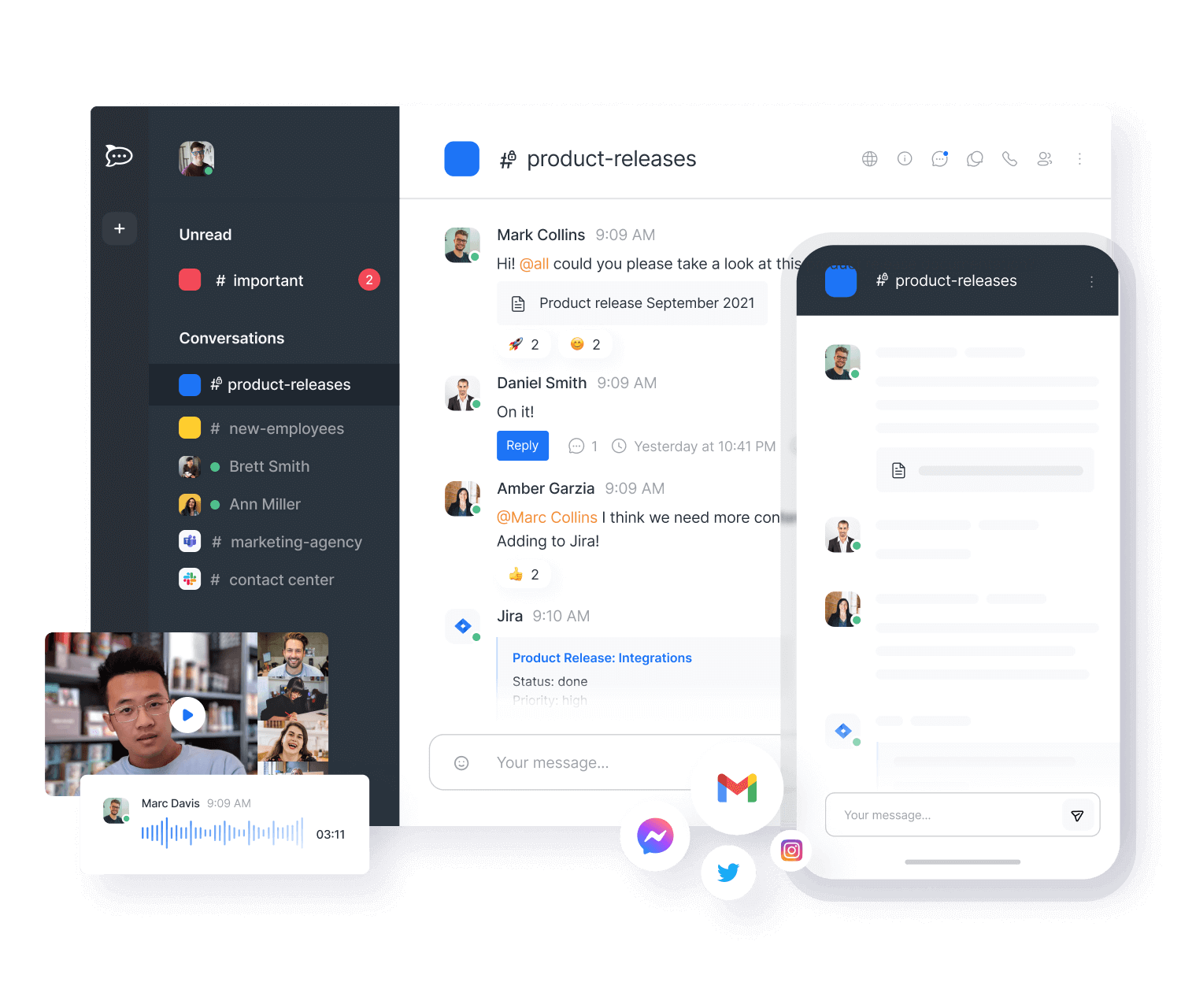 |
Rocket Chat is an open-source team collaboration platform that can be implemented for use in a HIPAA-compliant way. It is perfect for healthcare teams looking for a customizable solution that will improve communication without compromising security and privacy.
What you can do:
- Share encrypted messages between colleagues, keeping all sensitive information confidential.
- Create your workspace and channels for organizing teams based on a department or project.
- Secure video calls and file sharing among team members in your organization will never compromise patients’ privacy.
- Centralize your communications using Rocket Chat by integrating it into the existing health software to facilitate the workflow.
- Monitoring Activity: Observe activity using real detailed analytics to trace if communications are really effective while also observing HIPAA.
Pros:
- Its open-source in nature, thus it’s tailored to your specific needs.
- Strong security features, including end-to-end encryption.
- Large health care teams prefer this due to flexibility and scaling.
Cons:
- Geared more toward a technical setup and management compared to out-of-the-box.
- Limited customer support for self-hosted versions.
Pricing:
Rocket Chat is available in both free and paid-for plans. Pro Plan starting at $7 per user per month, offering advanced features like omnichannel communication, analytics, and enterprise integrations. The Enterprise Plan is priced at $35 per user per month, which includes enhanced security and dedicated support.
Notifyd
Notifyd is a HIPAA-compliant software to enhance patient communication. With real-time alerts and text messaging, Notifyd ensures that no critical message or patient update ever slips through the cracks.
What you can do:
- Send encrypted messages to patients and staff; all correspondences meet HIPAA standards.
- Automate appointment reminders and notifications to reduce missed appointments and conserve staff’s time.
- Receive immediate notifications of urgent patient updates to quickly respond with your team to changing conditions.
- Safely share files and sensitive documents with patients or colleagues.
- Effective analytics provide the insights that prove your messages are reaching and engaging the right people at the right time.
Pros:
- Real-time messaging keeps your team in the know and able to respond promptly.
- HIPAA-compliant to always keep patient data secure.
- Easy setup and very user-friendly interface.
Cons:
- There is limited customization.
- Might not be as robust for large healthcare organizations who have bigger needs.
Pricing:
Notifyd offers a free trial to explore its features. Paid plans start at $500 per branch per month or $5,400 per branch per year (with 10% savings). The plan includes unlimited users, notifications, and HIPAA-compliant integration with EMR/EHR systems.
Brosix

Brosix is a privacy-focused collaboration platform built for healthcare teams, offering HIPAA-compliant messaging and task management to streamline workflows.
What you can do:
- Communicate confidently within your healthcare team while ensuring patient confidentiality.
- Share sensitive documents and images with team members in a protected environment.
- Host remote meetings while maintaining compliance with healthcare privacy regulations.
- Assign tasks and track progress to enhance workflow and project management.
- Control access levels based on team members’ roles to ensure security and promote collaboration.
Pros:
- HIPAA-compliant messaging ensures privacy for team communication.
- Task management features improve team workflow efficiency.
- Secure document sharing helps maintain patient confidentiality.
Cons:
- More suitable for larger teams with complex communication needs.
- May not be necessary for smaller practices that focus primarily on patient communication.
Pricing:
Brosix offers three pricing plans. The Startup plan is free for up to 3 users, with basic features like private team networks and text chat. The Business plan is $4 per user per month (or $5 if billed monthly) and adds features like video chat, screen sharing, and chat rooms. The Premium plan is $6 per user per month (or $8 if billed monthly), offering advanced controls, multiple admins, and enhanced security.
OnPage

OnPage is a critical alert and escalation platform built for healthcare teams that need real-time notifications for urgent communications. Whether it’s a hospital emergency room or urgent care, OnPage ensures critical alerts reach the right staff immediately.
What you can do:
- Receive real-time critical alert notifications to stay informed about urgent situations.
- Implement escalation protocols for time-sensitive communications.
- Get audio alerts that cannot be missed to ensure immediate attention.
- Integrate OnPage seamlessly with your existing workflows and systems.
- Use the user-friendly mobile app interface for easy communication management.
Pros:
- Real-time alerts and audio notifications ensure no message is missed.
- Works seamlessly with existing healthcare workflows and systems.
- Ideal for high-pressure environments like emergency departments and urgent care.
Cons:
- Might be too feature-heavy for practices that don’t deal with many urgent cases.
- Higher pricing tiers for more features could be unnecessary for smaller teams.
Pricing:
OnPage offers several pricing tiers ranging from $13.99 to $28.99 per user per month, depending on the features selected. A free trial is also available for potential users to evaluate the service before committing.
Blaze
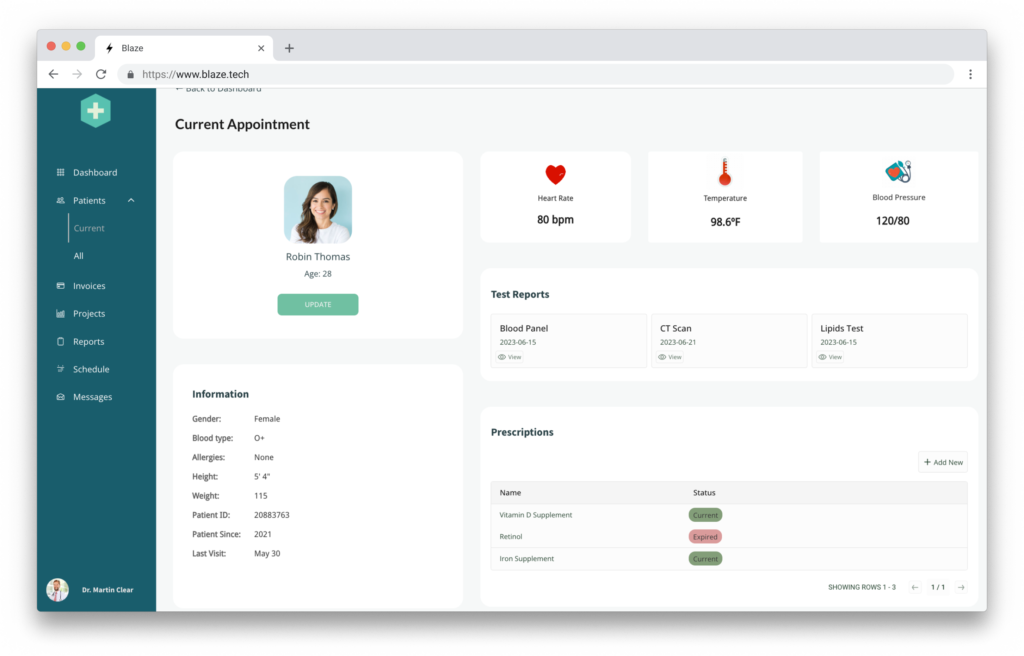
Blaze is a HIPAA-compliant healthcare communication solution that allows providers to build custom apps without writing code. From protected messaging to automated follow-ups, Blaze simplifies patient communication and workflow management.
What you can do:
- Build a custom healthcare messaging app tailored to your needs, no coding required.
- Ensure HIPAA compliance with built-in security features.
- Set up secure messaging between staff members and streamline communication.
- Automate patient appointment scheduling, reminders, and check-ins.
- Integrate Blaze with your existing healthcare systems and databases.
- Track patient data access automatically with built-in security logs.
Pros:
- Customizable app creation without the need for developers.
- Built-in HIPAA compliance and top-notch security features.
- Automation of patient scheduling and follow-ups saves time.
- Easy integration with existing systems.
Cons:
- Requires a learning curve for creating custom apps.
- Pricing may be higher for organizations with complex needs.
Pricing:
Blaze offers two pricing plans. The Internal Plan is priced at $500 per month, providing unlimited internal users, apps, data storage, multi-source data syncing, robust data security, and role-based permissions, but does not include external user access. The Enterprise Plan has custom pricing and includes all the features of the Internal Plan, plus custom APIs, branding, advanced user management, public web applications, and HIPAA compliance for organizations with complex security requirements and external user needs.
Solutionreach

Solutionreach is a secure HIPAA-compliant patient communication platform designed for healthcare providers. It offers a variety of tools to streamline patient engagement, improve communication, and enhance workflow efficiency, all while ensuring privacy and security.
What you can do:
- Send HIPAA-compliant text messages, appointment reminders, and confirmations to patients, ensuring they stay informed.
- Automate patient follow-ups, reminders, and surveys to improve engagement without manual outreach.
- Share lab results, medical records, and important updates directly with patients.
- Improve patient satisfaction with personalized messages and communications.
- Manage all patient communications through a single platform, reducing the need for multiple tools.
Pros:
- Full HIPAA compliance with encryption.
- Automation features save time and enhance patient follow-up processes.
- Streamlined communications across a single platform for both patients and staff.
- Personalized patient communications help increase satisfaction.
Cons:
- Some users find the platform’s interface to be complex at times.
- Pricing can be high for smaller practices or those with limited resources.
Pricing:
Solutionreach offers customized pricing based on the size and needs of the healthcare organization. Pricing varies depending on features and the number of users.
OhMD
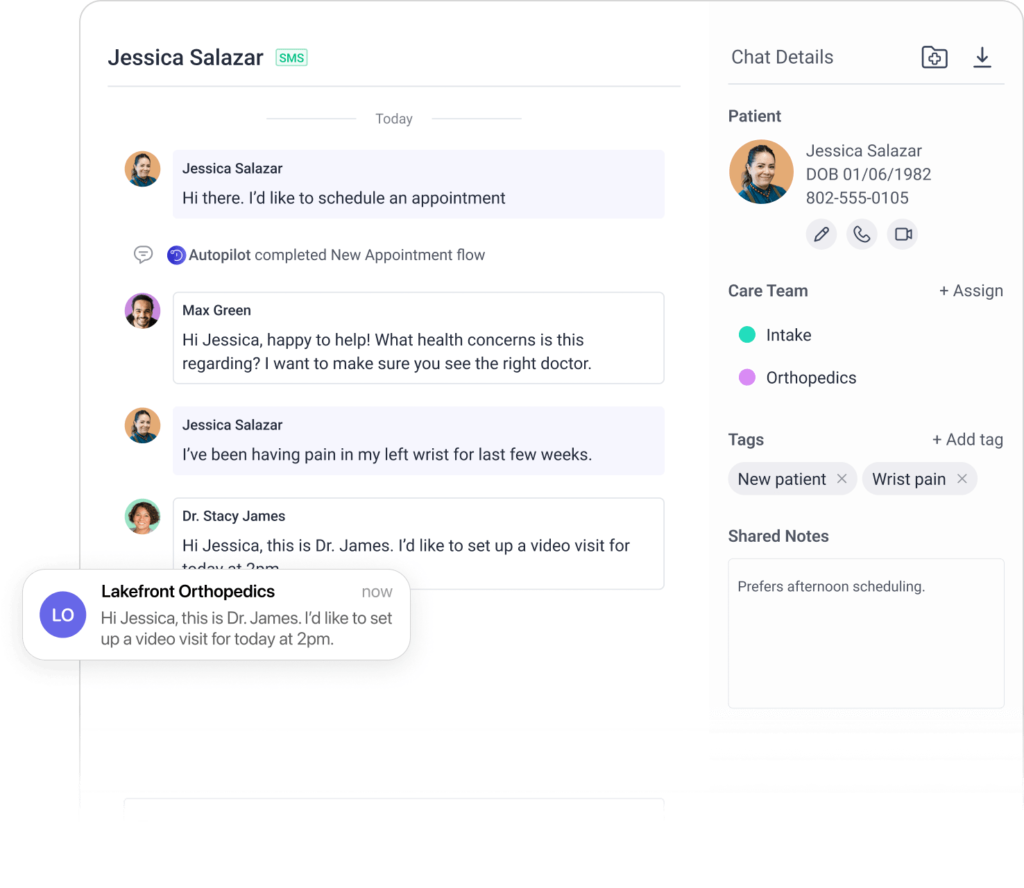
OhMD is a HIPAA-compliant healthcare communication platform that enables secure texting and video communication with both patients and healthcare teams. It seamlessly integrates with EHR systems to streamline workflows and enhance patient care.
What you can do:
- Send text messages and multimedia content to patients and staff without compromising privacy.
- Schedule and conduct HIPAA-compliant video calls for consultations and follow-ups.
- Automate appointment reminders, follow-ups, and health check-ins to keep patients informed.
- Easily integrate with your existing Electronic Health Record (EHR) systems for better data synchronization.
- Maintain patient confidentiality with end-to-end encryption and secure data handling.
Pros:
- Full HIPAA compliance and end-to-end encryption.
- Easy integration with EHR systems to centralize patient data.
- Streamlined communication between healthcare providers and patients.
- Automates follow-up tasks, saving time and reducing manual workload.
Cons:
- Limited customization options in certain features.
- Some users report occasional issues with user interface navigation.
Pricing:
OhMD offers customized pricing based on the size and needs of the healthcare organization.
Updox
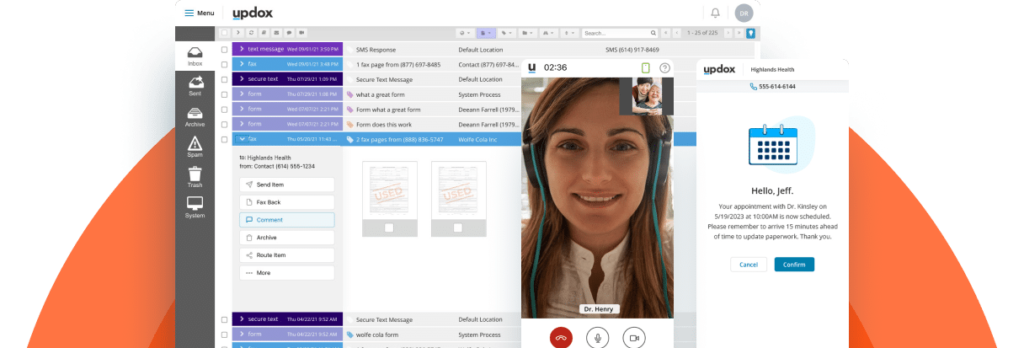
Updox is a HIPAA-compliant communication platform designed for healthcare practices to enhance patient engagement and streamline workflows. It offers secure messaging, telehealth services, and electronic forms, helping medical professionals connect efficiently with patients and staff.
What you can do:
- Send text messages to patients and staff, maintaining compliance with HIPAA regulations.
- Conduct telehealth video appointments to provide virtual care without compromising security.
- Collect patient information using electronic forms, reducing paperwork and manual data entry.
- Automate appointment reminders, follow-ups, and confirmations to improve patient attendance.
- Integrate with EHR systems to keep patient data up to date and easily accessible.
Pros:
- Comprehensive patient communication with secure messaging and telehealth.
- Reduces administrative workload with electronic forms and automated reminders.
- Seamless integration with major EHR systems.
- Improves patient engagement with easy-to-use communication tools.
Cons:
- Some users report occasional glitches with telehealth video calls.
- Pricing may be higher for small practices.
Pricing:
Updox offers customized pricing based on the size and needs of the practice. The base plan typically starts around $150 per month for secure messaging and telehealth features, with higher-tier plans available for additional functionalities and integrations.
Doxy.me
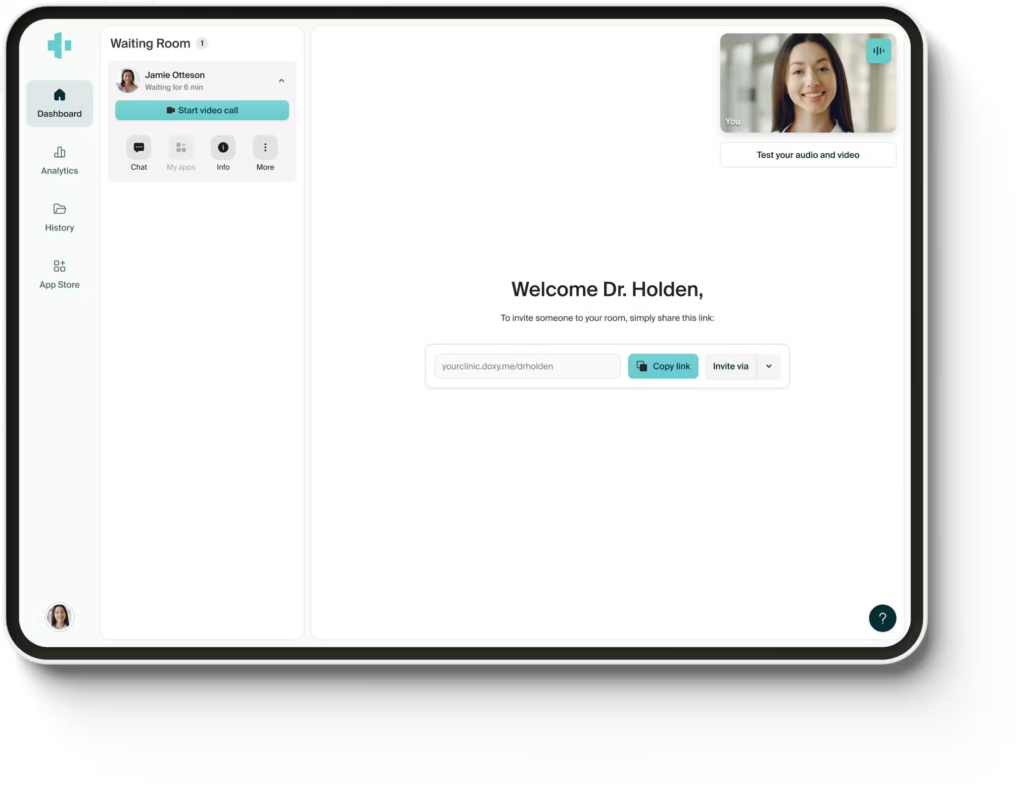
Doxy.me is a telemedicine platform designed for secure video conferencing and messaging with patients. It offers a no-download, browser-based experience, making it easy for healthcare professionals to connect with patients without the need for additional software. Doxy.me ensures full HIPAA compliance and encryption to protect patient data during virtual consultations.
What you can do:
- Conduct secure, HIPAA-compliant video consultations with patients, without the need for downloads or special software.
- Send encrypted text messages to patients to confirm appointments or provide follow-up information.
- Use simple, customizable virtual waiting rooms to manage patient flow before appointments.
- Ensure patient confidentiality with end-to-end encryption for all communications.
Pros:
- Browser-based, no software installation required.
- HIPAA-compliant with encrypted communication.
- Simple, user-friendly interface for both patients and providers.
Cons:
- Limited customization options for the platform.
- Free plan has basic features, while advanced tools require a paid subscription.
Pricing:
Doxy.me offers a free plan with essential video calling features. The Professional plan costs $35 per month per provider, including branding options and HD video. The Clinic plan starts at $50 per month per provider, with additional features like group calling and room management.
Final HIPAA texting rules
In healthcare, communication isn’t just important – it’s everything. According to the 2019 State of Healthcare Communications Report by TigerConnect, 52% of healthcare organizations experience communication disconnects that affect patients daily or multiple times a week. These aren’t minor hiccups – they can delay care, disrupt workflows, and put both patients and providers at risk.
That’s why using HIPAA-compliant messaging apps isn’t optional. They let your team move fast while keeping patient information secure, helping you avoid fines or lawsuits.
Here’s how to stay on track:
- Encrypt everything – Make sure your texting platform has end-to-end encryption. Your patient data should never be vulnerable, especially during telehealth or remote communications.
- Get consent before texting – Always have written consent before messaging patients. It keeps everything transparent and HIPAA-compliant.
- Keep texts lean – Only share PHI when absolutely necessary. Use HIPAA-compliant chat for appointment reminders, admin updates, and general communication, avoid sensitive medical details in the text body if you can.
- Control access – Limit who can send, receive, or see patient messages. Role-based permissions keep PHI out of the wrong hands.
- Lock it down – Password-protect devices and use two-factor authentication. Even if a login is compromised, your data stays safe.
- Audit regularly – Check logs to see who accessed what and when. This is crucial for compliance and catching potential issues.
- Set data policies – Decide how long patient info is stored and make sure old or unnecessary messages get securely deleted.
- Train your team – Even the best apps won’t protect your patients if staff don’t know HIPAA rules. Regular training makes sure everyone stays sharp.
Following these steps keeps your communication safe, legal, and effective. Because in healthcare, every message matters, and mistakes can be costly.
Chanty makes it simple
Chanty is a HIPAA-compliant Slack alternative built with healthcare teams in mind.. It keeps your communication clear, fast, and fully protected. With secure messaging, end-to-end encryption, and audit logs, your staff can focus on care – not worrying about whether texts are safe.
See it for yourself. Book a demo today and experience smooth, compliant communication that actually works in real healthcare settings.



